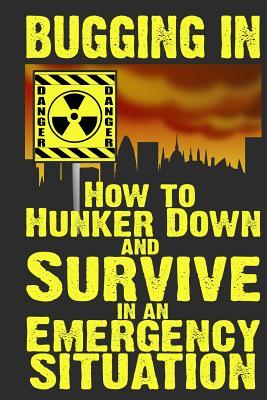- What hunkering down is and why it's preferred over bugging out.
- The disasters you should start prepping for.
- The most common type of disaster. HINT: It's the one people are least prepared for.
- Bugging out vs. bugging in.
- The meaning of normalcy bias and how it can get you killed.
- Questions you need to ask yourself in an emergency situation that will help you determine the best course of action.
- The 5 plans you need in order to survive.
- Building a Get Home Bag that will give you the best chance of making it home if a disaster occurs while you're away.
- How long should you prepare to survive on your own?
- Shelter: Don't make any assumptions.
- Shutting down utilities.
- Water . . . Must have water.
- How to keep from freezing to death when the power is out.
- How not to starve to death.
- Staying clean when there's no running water.
- How to handle first aid emergencies when there is no professional medical care available.
- How to stay safe when you can't call the cops.
- How stockpiling alcohol and tobacco might save your life.
- Why you might not want to run a generator. HINT: There's a better option.
- Sealing yourself in to protect your family from chemicals and radiation.
- The attack that could render all electronic equipment useless and how to protect your equipment.
- How to communicate when the phones stop working.
- Appendix #1: A list of supplies you'll need.
- Appendix #2: Survival skills you're going to need to learn (if you don't already have them).
- Appendix #3: Step-by-step guide to getting prepped.

Book
Bugging In: How to Hunker Down and Survive in an Emergency Situation
by M. Anderson
(Write a Review)
Paperback
$7.97
- What hunkering down is and why it's preferred over bugging out.
- The disasters you should start prepping for.
- The most common type of disaster. HINT: It's the one people are least prepared for.
- Bugging out vs. bugging in.
- The meaning of normalcy bias and how it can get you killed.
- Questions you need to ask yourself in an emergency situation that will help you determine the best course of action.
- The 5 plans you need in order to survive.
- Building a Get Home Bag that will give you the best chance of making it home if a disaster occurs while you're away.
- How long should you prepare to survive on your own?
- Shelter: Don't make any assumptions.
- Shutting down utilities.
- Water . . . Must have water.
- How to keep from freezing to death when the power is out.
- How not to starve to death.
- Staying clean when there's no running water.
- How to handle first aid emergencies when there is no professional medical care available.
- How to stay safe when you can't call the cops.
- How stockpiling alcohol and tobacco might save your life.
- Why you might not want to run a generator. HINT: There's a better option.
- Sealing yourself in to protect your family from chemicals and radiation.
- The attack that could render all electronic equipment useless and how to protect your equipment.
- How to communicate when the phones stop working.
- Appendix #1: A list of supplies you'll need.
- Appendix #2: Survival skills you're going to need to learn (if you don't already have them).
- Appendix #3: Step-by-step guide to getting prepped.
Paperback
$7.97